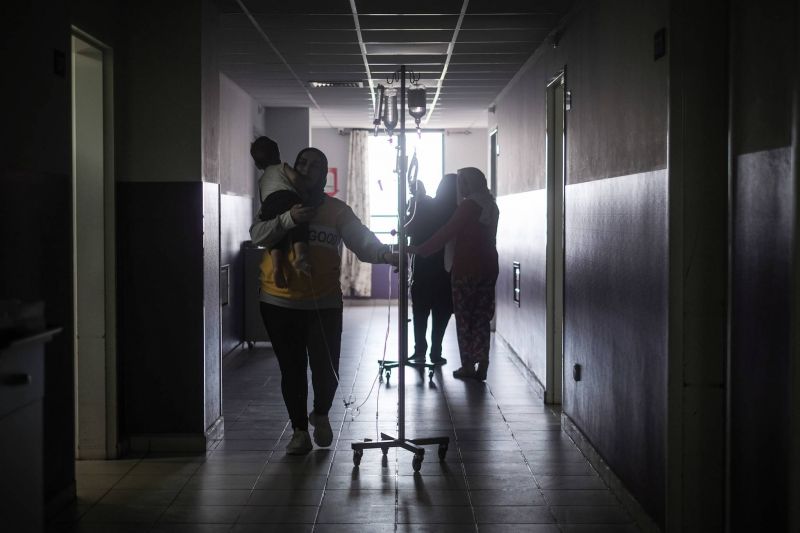
Woman cradles infant son with cholera in the hallways of Dr. Abdullah al-Rassi Government Hospital in Halba. (Credit: João Sousa,/L'Orient Today)
Want to get the Morning Brief by email? Click here to sign up.
Michel Aoun’s term as president ended yesterday, making today the first day of a governance vacuum at both the cabinet and presidential levels in Lebanon. Four attempts at naming Aoun’s successor have failed, while the former president claimed that consensus among MPs “is far from happening” on his last day in office during an interview with Kuwaiti newspaper Al-Anba. Parliament Speaker Nabih Berri announced that he would convene a fifth election session “within three days” from Sunday. Parliament is scheduled to convene on Thursday to discuss the status of the caretaker cabinet after Aoun addressed a letter to Berri calling for the government’s resignation. Caretaker Prime Minister Najib Mikati considered Aoun’s letter redundant, assuring that his government’s “ministers will continue their work.” Aoun and Mikati once again traded blame for the delays in government formation. The Iranian Foreign Ministry yesterday called for government formation in Lebanon, the latest in a series of similar statements from international actors.
New Electricité du Liban tariffs come into effect today, marking a drastic increase from previous prices. EDL has been charging archaic tariffs and operating at a loss for years, hemorrhaging state funds while failing to provide reliable electricity coverage. The old tariffs ranged between $0.02 to $0.13 per kilowatt hour were calculated at the LL1,507 exchange rate, while the new prices will range from $0.1 to $0.27 per kilowatt hour at the central bank dollar to lira exchange platform Sayrafa rate — around LL10,000 less than the parallel market exchange rate, which currently stands at around LL36,500. In comparison, private generators filling EDL’s supply gap have since September charged $0.44 per kWh produced. Caretaker Energy Minister Walid Fayad encouraged the tariff increase as ultimately economical, speculating that the new tariffs would boost EDL’s hours of coverage and lead to savings on subscribers’ private generator fees. Fayad last Friday launched fuel purchasing tenders, aiming to purchase enough of the substance to keep power plants operational for 8-10 hours per day.
If the government implements an earlier decision by the Finance Ministry, the official lira to US dollar exchange rate will increase tenfold today. The exchange rate hike is expected to be phased in gradually, initially applying to customs duties on imports and to VAT on goods priced in dollars. The increase is a step towards unifying exchange rates — one of the reforms expected from Lebanon by the International Monetary Fund to unlock a multi-billion dollar aid package. The new rate matches the rate adopted in the long-overdue 2022 budget, approved in late September. In an attempt to show better planning for the year ahead, caretaker Prime Minister Najib Mikati chaired a ministerial meeting yesterday to discuss the 2023 draft budget.
Caretaker Health Minister Firass Abiad announced the arrival of a French donation of cholera vaccines, repeating warnings that the disease could become endemic in Lebanon if the necessary measures are not taken. In a statement by the Ministry of Health published on Tuesday morning of recorded numbers dated Monday, cholera had caused 17 deaths and there were 390 confirmed infections since the first recorded case in almost 30 years was identified in northern Lebanon on Oct. 5. The disease has spread beyond the initial area of contagion with cholera traces found in water sources in Tripoli and sewage water in Mount Lebanon and Beirut. Abiad on Sunday reassured that “the epidemic is still in its infancy and can be stopped,” while issuing the first warning of a potential endemicity that would further jeopardize the already near devastated Lebanese economy. An endemic disease is a disease that is consistently present in a certain area or region, where the number of patients and the extent of the spread can be predicted.
Qatari state-owned energy company QatarEnergy CEO Saad al-Kabi announced ongoing discussions with Lebanon to claim a 30 percent share in a consortium licensed to explore Lebanese offshore oil and gas blocks. The consortium is now composed of French energy company TotalEnergies affiliated companies DAJA215 and DAJA216 along with Italian energy firm ENI. Lebanese officials had called on the French energy group to initiate exploration as soon as the indirect maritime border negotiations with Israel concluded. Paralleling the interest in offshore block licenses, there has been a surge in real estate demand in the southern border town of Naqoura — the site of separate meetings between Lebanese and Israeli delegations last Thursday with US mediator Amos Hochstein to sign and deliver the final agreement.
In case you missed it, here's our must-read story from yesterday: “‘Waiting for things to get worse’: Inside the epicenter of Lebanon’s cholera outbreak.”
Compiled by Abbas Mahfouz